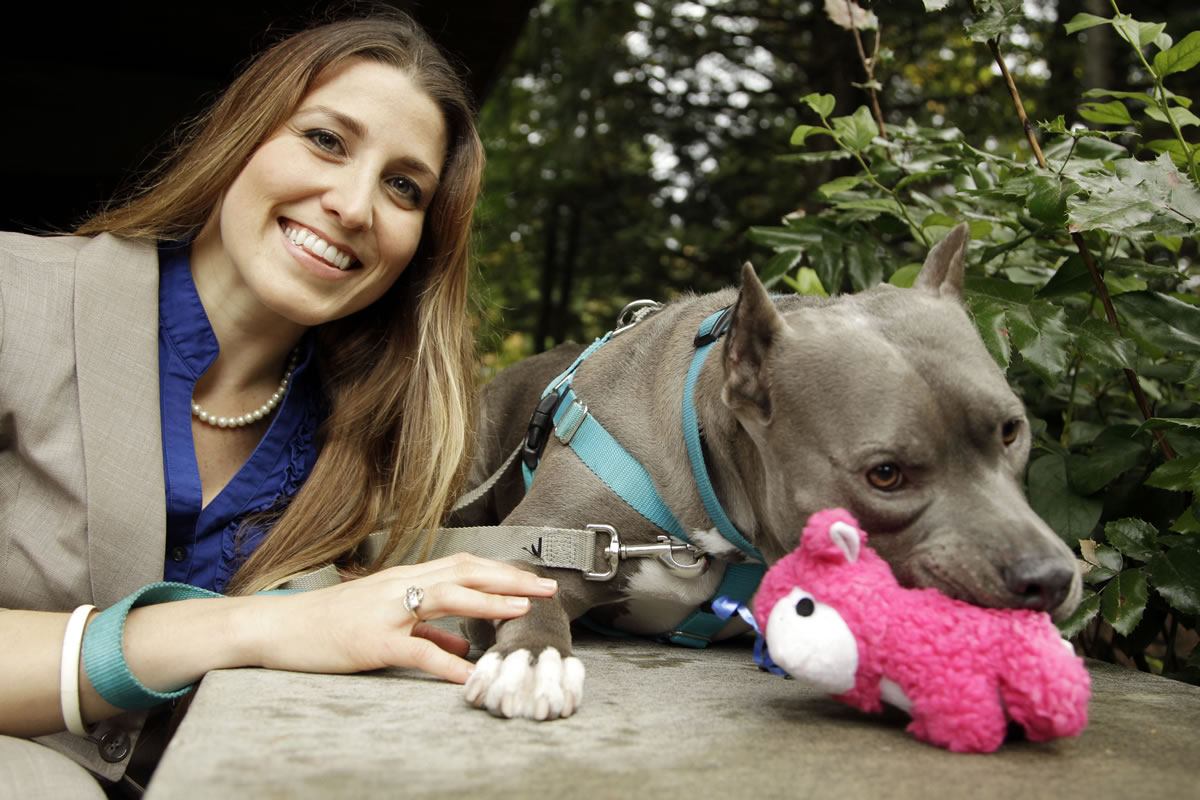LOS ANGELES — Mitzi Bolanos adopted a pit bull a few years ago, only to find that discrimination was part of the deal. Because of her dog, she was often told where she could or couldn’t live or work.
“I am a Hispanic female, and I never felt discriminated against in this country until I started walking around with my pit bull,” Bolanos said.
In September, the 28-year-old lawyer went back to school to get a master’s of laws in animal law. She wants to use her degree — the first of its kind in the world — to help fight breed bias.
Bolanos will be among the first class of six students to get such a degree from Lewis & Clark Law School’s Center for Animal Law Studies. Enrollment in the yearlong program is expected to grow to 15 or 20 students in three to five years, said attorney Pamela D. Frasch, assistant dean and executive director of the law center.
Interest and enrollment at Lewis & Clark for the $35,000-a-year program have mirrored the pet revolution in the United States, Frasch said.
“But while laws have improved and grown, there is still a disconnect between what animals deserve and what protections they get,” Frasch said. That led Lewis & Clark to develop the master’s of laws program with the Animal Legal Defense Fund in Portland.
Bolanos grew up in Miami, where pit bulls are banned. When she moved to New Orleans in 2011, she volunteered at the Louisiana Society for the Prevention of Cruelty to Animals. She adopted a pit bull named Bubba who was covered in scars and had a fresh chemical burn down his back.
Life with a pit bull hasn’t been easy. She said she has faced citywide breed bans and at homes in cities without bans. She said their travel was restricted when she wanted to take the 65-pound Bubba home for the holidays, but most airlines banned Bubba’s breed and one required an expensive “dangerous dog” crate.
More than 650 U.S. cities ban pit bulls or require sterilization, muzzles in public or extra insurance. Some regulate the size of fences that keep pit bulls enclosed or the weight of leashes that keep them restrained. Even the Army and the Marines ban pit bulls in base housing.
According to DogsBite.org, a Texas-based dog bite victims’ group that encourages breed bans, pit bulls were responsible for 22 of 31 fatal dog attacks in 2011. The breed — loosely defined as American pit bull terriers, American Staffordshire terriers or Staffordshire bull terriers — is large, strong and easily trained to fight, making them targets for dogfighting operations.
In turn, their reputation made them targets of the acts of discrimination that Bolanos encountered. But they also led her to the program, at a time when she was looking to combine her interests with her job.
“When ABA (American Bar Association) approval for this program was announced, there was just no other option for me. I knew I had to come here,” Bolanos said.
Expanding field
When Frasch started teaching in 1998, only a handful of law schools offered animal-related classes. “Today, 140 law schools out of 200 ABA-accredited law schools offer at least one animal law course,” she said.
Frasch called animal-related law “so broad and so deep, it touches every other area of law.” She cited its intersections with contract law in tenant disputes over weight limits in leases; anti-cruelty laws that hinge on criminal law; and estate law as more pet owners include animals in wills and trusts.
The extra degree also could help law school graduates stand out, since the U.S. has more than 1.2 million licensed attorneys.
Madeline Bernstein, an animal law attorney and president-CEO of the Society for the Prevention of Cruelty to Animals Los Angeles, said good lawyers can change laws that affect millions of people and animals with just one case — whereas law enforcement can only do so much, one arrest at a time.
The degree also comes at a time when more people are becoming aware of the treatment of animals, both as pets and food, said Bernstein, who is a visiting advocate with the new program. They want to know how food animals are treated and how circus and rodeo and entertainment animals are cared for, she said.
Frasch agreed, saying she expected the treatment of farm animals to be the center of coming legal challenges in the U.S.
Martha Claire Howe, a 31-year-old social services worker from Phoenix, said she enrolled in the master’s program so she could one day work to establish a humane education law in every state. She joined the animal rights movement eight years ago, after she watched a 4-minute video by the People for the Ethical Treatment of Animals.
“I don’t want to be a practicing attorney but to work on policy,” Howe said.



